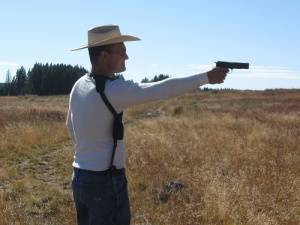Accessory After the Fact – PC 32
Accessory to a crime after the fact means that you helped somebody after that person committed a felony crime with the intention that they escape punishment. It is a less serious charge than to help somebody in the planning or commission of a felony crime, but it is still a serious charge. Examples of being an accessory after the fact include:
- Giving somebody who committed a felony crime a false alibi by saying you were with them, or saw them at a place other than the crime scene during the time when the crime occurred;
- Letting the person who committed a felony crime hide out in your home;
- Allowing the person to hide stolen money or valuables on your property;
- Helping the person escape the police by driving them to another location; or
- Helping the person hide, dispose of, or destroy incriminating evidence, such as a weapon or bloodstained clothing.

In order to be an accessory after the fact, you have to have known that another person has committed a felony crime, and you then helped that person in some way, after the crime was committed, with the intention of helping them escape arrest and/or criminal punishment for the crime.
California Penal Code 32 PC says: “Every person who, after a felony has been committed, harbors, conceals, or aids a principal in such felony, with the intent that said principal may avoid or escape from arrest, trial, conviction, or punishment, having knowledge that said principal has committed such felony or has been charged with such felony or convicted thereof, is an accessory to such felony.” 1
Related Crimes
There are several other crimes related to chargers of accessory after the fact. These include, but are not limited to the following:
Aiding and Abetting (PC 31)
In California, if you help somebody plan or commit a crime you can be charged with the crime itself. For instance, if you know your friend is planning to rob an armored truck, and you help plan the crime by offering to hide the getaway car and some of the money in your garage during the planning of the crime, you could be charged as a principal, which means you can be charged with the crime of armed robbery.
Obstruction of Justice (PC 148)
If the crime committed is a misdemeanor, for instance petty theft, you cannot be charged with accessory after the fact. However, you could be charged with obstruction of justice.
For example, if a friend stole a bicycle, and hides it in your garage, and the bicycle is worth less than $950, you have helped your friend commit petty theft. You may be charged with obstruction of justice, for helping your friend hide the evidence and avoid arrest.
Prosecution
In order to convict you of being an accessory to a crime after the fact under Penal Code 32 PC, the prosecution must prove beyond a reasonable doubt that all the elements of the crime were present. The elements which the prosecution must prove are:
- Another person committed a felony;
- You knew that person committed, had been charged with, or was convicted of the felony;
- After the felony was committed, you harbored, concealed, or aided the perpetrator; and
- When you acted, you intended that the perpetrator escape arrest, trial, conviction, or punishment. 2

Say for example, that you hid a car in your garage because your friend asked you to. Your friend tells you that she is trying to come up with the car payment money she owes and, in the meantime, doesn’t want the car repossessed.
You are not aware that the real reason you are hiding the car is because your friend used it when she robbed an armored truck. She wore a disguise during the robbery. But the car was there, she drove the car away, and the car could be traced back to your home. Moreover, some of the money she stole from the armored truck is hidden in the trunk of the car. The car is an important piece of evidence which could help the police prove that she committed the felony crime of armed robbery.
- Element one is present: your friend robbed an armored truck.
- Element two is not present: you knew nothing about the robbery
- Element three is also present: after your friend robbed the truck, you helped your friend by hiding the car and the money.
- Element four is not present: you were not trying to help your friend get away with the robbery because you did not know the robbery had occurred.
You should not be convicted of this crime under the facts presented. In order to convict you, the prosecutor must prove beyond a reasonable doubt that:
- Your friend committed a felony crime such as armed robbery;
- You found out about the felony crime, after it occurred;
- You helped your friend after she committed the felony crime; and
- By doing what you did to help your friend, you intended to help your friend to escape arrest, conviction, and punishment, after she committed the felony crime.
Legal Concepts of Accessory After the Fact
Under Penal Code 32 PC, the crime of accessory after the fact depends on two legal concepts:
1. Mens Rea. Mens rea is a Latin term, which means guilty mind. In order to be found guilty of most crimes, you must know that you are breaking the law.
2. Actus rea. In this instance, you must have known that somebody else committed a felony crime, and you intend to help that person to escape arrest and punishment after that other person committed the crime.
Actus reas is a Latin term which means guilty act. In order to be convicted of this crime, a crime must have taken place and you must have done something to help the person who committed the crime to escape arrest and/or punishment.
Sentencing for Accessory After the Fact (California Penal Code Section 33)
Under Penal Code 32 PC, accessory after the fact is a wobbler crime, meaning that the prosecutor can charge you with either a felony or a misdemeanor. Although the original crime itself must have been a felony in order to constitute you as an accessory after the fact, the crime of being an accessory after the fact can be charged as a misdemeanor or felony. Factors the prosecutor may take into account when determining whether to charge you with a felony or a misdemeanor are:
- The seriousness of the felony crime;
- What you did to help the perpetrator; and
- Whether you have a criminal record.
If you are convicted of felony accessory after the fact, you could face 16 months, two, or three years in prison and/or a fine of up to $5,000.
If you are convicted of misdemeanor accessory after the fact, you could face up to 364 days in county jail and/or a fine of up to $5,000.
Defenses to Accessory After the Fact Charges Under Penal Code 32 PC
There are a number of defenses that skilled defense attorney can use to plead your case. The following are common defenses utilized by experienced criminal defense attorneys:
1. You were under duress

If the person who committed the felony threatened your life, and you were reasonably sure they would carry out the threat if you did not help them, you are not an accessory after the fact.
For example, you are acting under duress if somebody comes to your front door, pulls out a gun, and tells you that you have to hide them, and help them destroy or hide the evidence. Or, perhaps somebody jumps in your car, pulls out a weapon, and demands that you drive them to another location, after they committed a felony.
2. You had lack of knowledge
If you did not know that you were helping somebody who committed a felony crime, you lacked the awareness that you were helping them to escape arrest, trial, conviction, or punishment.
For example, an old friend, who lives out of town, calls you up and says his wife is divorcing him and has kicked him out of the house. He wants to visit you for a few weeks. You don’t know that the real reason he wants to come visit is that he has been convicted of a felony crime, and he wants to hide out at your place instead of reporting to the authorities to serve his prison sentence.
3. You were mentally incapacitated
The law frequently uses, as a standard of ethical, law abiding behavior, what a reasonable person would or would not do in a similar situation. Somebody who is impaired by an intoxicant, such as alcohol or another drug, by a mental illness, or by a physical illness that affects their ability to think, lacks the capacity to think and act in a reasonable way. Even if the impairment is temporary, your attorney can argue that you lacked the capacity to intentionally commit a crime.
For example, if your friend shows up at your door and asks you to hide her from the law, or drive her to another location, and you are under the influence of drugs or alcohol, a skilled attorney could argue that you lacked the capacity at that time to make a rational decision about whether you wanted to be involved in a crime.
4. You were a mere bystander
If you see or hear a crime being committed, and you refuse to give information to the police, because you do not want to be involved, you are not an accessory after the fact. Your intention is to mind your own business, not to help the perpetrator escape justice.
You are under no legal obligation to volunteer information to the police. If you are subpoenaed to testify at a deposition, or at court, then you have a legal obligation to appear and testify. But you are under no obligation to give your contact information to police, or to tell the police or a detective what you witnessed, even if they ask you to come in for questioning. The best thing you could do under such circumstances would be to politely refuse, or ask to have your attorney present.
For example, if you see a drive by shooting in your neighborhood, and you are afraid to talk to police because you fear for your life due to possible gang retaliation, you do not have to tell the police what you saw.
5. No felony occurred
Some crimes are considered wobblers in California. What this means is that they can be charged as either felonies or misdemeanors. If a crime is charged as a felony’ you could also be charged with accessory after the fact, if you knowingly helped the perpetrator after the crime occurred. If the crime is charged as a misdemeanor, you could be charged with another crime, such as obstruction of justice, but may not be charged with accessory after the fact.
FAQs
What if I help somebody after they commit premeditated murder? Will I be charged with murder too?

If you did not know they planned to commit murder, but they asked you for help after the murder occurred, you can be charged for being an accessory after the fact, but not for murder. In order to be charged with the felony crime itself, you must have helped in the planning or commission of the crime.
A very important distinction to be aware of is that if you knew that they were planning to kill somebody before the crime occurred, and at that time you offered to help them after they killed the person, then you could be charged with murder.
For example, if your relative shows up at your house and asks you to hide them after they killed somebody already, and you agree to do it, and then do hide them, you cannot be charged with murder, but you can be charged with accessory after the fact,
If my friend was originally charged with a felony in a wobbler offense and the charge was reduced to a misdemeanor in a plea bargain, will I still be charged with accessory after the fact?
If the crime your friend committed was originally charged as a felony, you could be charged with accessory after the fact. A skilled attorney may be able to also get your charge reduced to something less serious, like obstruction of justice, depending on the facts of your case and whether you have any prior criminal record.
What if unintentionally helped somebody commit a felony? Can I be charged with accessory after the fact if I don’t report them to the police?
If you did not intend to help them to get away with a crime at the time you rendered the help, then one of the elements of accessory after the fact is missing. But you need to stop helping the person when you find out about the crime. For instance, you need to tell your friend you cannot let them stay at your house, store evidence or stolen valuables there, etc. Also, it would be a very good idea to talk to an experienced attorney about the specific facts of your situation, and let the attorney advise you on what you need to do next, in order to avoid criminal charges. You may safely talk to an attorney at any time, and that attorney is under an ethical obligation not to repeat what you say, even if you have not been formally charged with a crime.
Call Wallin & Klarich Today if You Are Facing the Charge of Accessory After the Fact
If you have been accused of being an accessory to a felony crime after the fact, you will need an experienced and skillful attorney to launch a vigorous defense on your behalf. Wallin and Klarich criminal defense attorneys have over 40 years of experience in successfully defending clients charged with serious crimes in California. We will meet with you immediately, review the facts of your case, and begin to plan a defense strategy that will help you to get the very best outcome possible.
With offices in Los Angeles, Sherman Oaks, Torrance, Orange County, San Diego, Riverside, San Bernardino, Ventura, West Covina and Victorville, there is an experienced Wallin & Klarich criminal defense attorney nearby, who can be there for you in an emergency, no matter where you work or live.
Call us today at (877) 4-NO-JAIL or (877) 466-5425 for a free phone consultation. We will get through this together.
1. [http://leginfo.legislature.ca.gov/faces/codes_displayText.xhtml?lawCode=PEN&division=&title=2.&part=1.&chapter=&article=]↩
2. [http://www.courts.ca.gov/partners/documents/calcrim_juryins.pdf]↩

